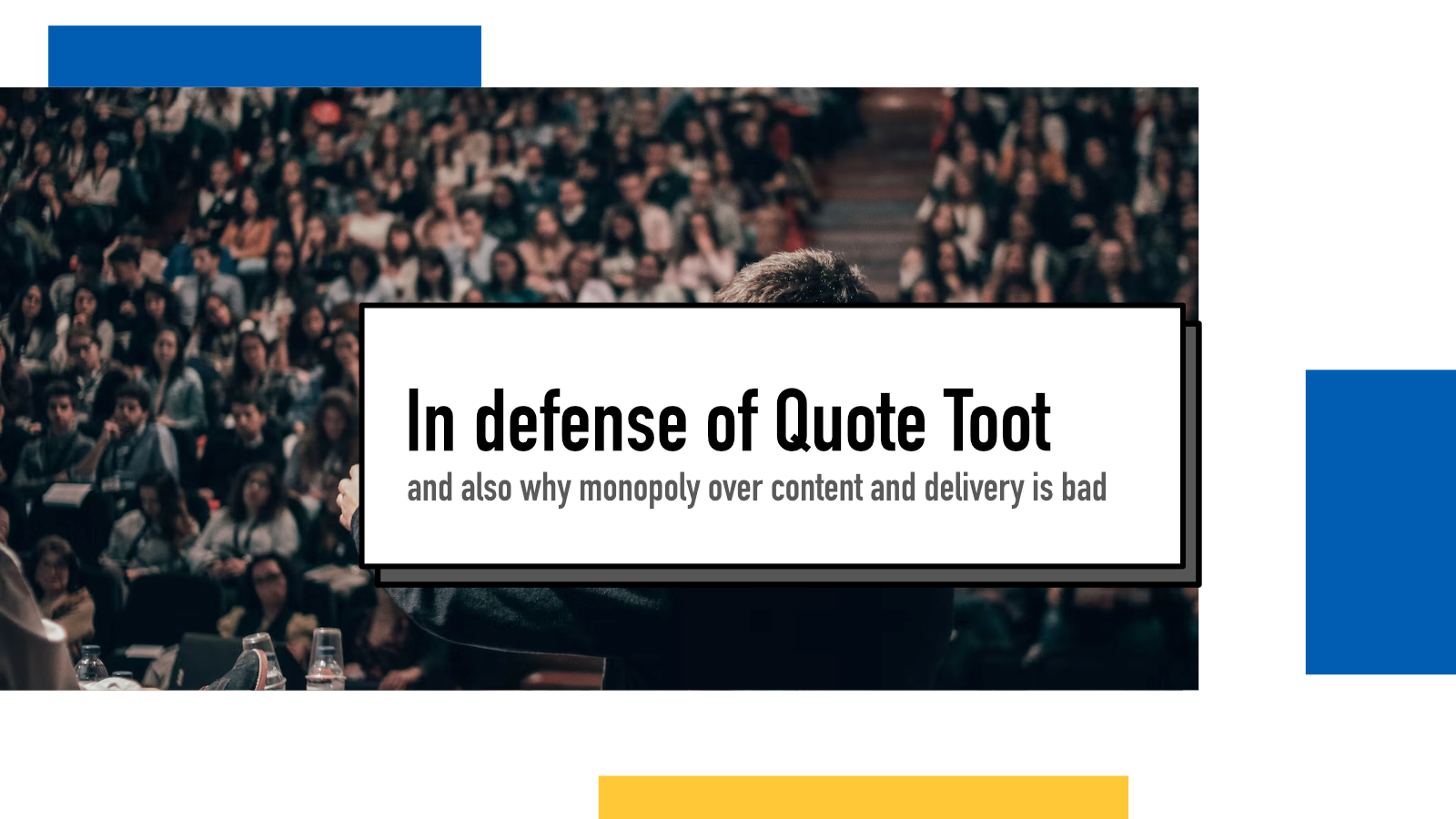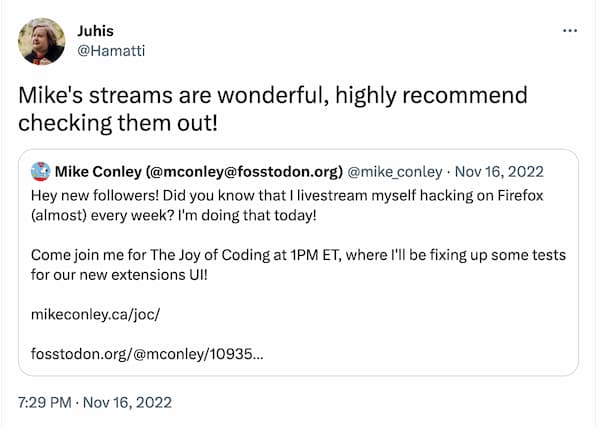In defense of Quote Toots

This blog post is three opinion pieces in a trenchcoat because they are all related and I couldn't come up with a solid post for each individually. I'm going to talk about 1) Quote Toots, 2) my feelings towards people wanting each app to be the same and 3) how bad it is when company owns the content and the delivery.
Let's start with the toots.
Quote tweets and toots are great
Since the start of the most recent Twitter exodus into Mastodon, one much debated topic has been whether Mastodon should implement a quote feature or not.
So what is a quote tweet/toot? It's a feature that got popular in Twitter where a user, in addition to retweeting someone's post, can add their own commentary on top. It looks like this:

It's a feature that can be used to share great things to your followers with your personal recommendation but also you can use it to demonize, target & rally followers against someone. So like any technical feature, it has its pros and cons.
Scott Feeney wrote about the technical side of quote toots. Scott talks about how a quote toot is a link to another toot that is enhanced by a rich preview, interactability inside your instance, notifications to original tooter, an easy interface to quote toot and a way to see all the other quote toots from original toot. On another post, he also said that Mastodon is better without quote toots.
The developer of Mastodon has stated that he believes it inevitably adds toxicity to people's behaviours and thus does not want to add it. This has been at the center of many arguments. Jon Pincus wrote about quote toots and added a great amount of quotes from other people on the topic. Hilda Bastian talked about this myth of quote tweets being inevitably toxic.
I personally wish to have quote toots. I often see things I'd like to share to my community but just boosting a post without adding my own commentary feels empty and doesn't really bring that much value with a lot of posts. Some have argued that I could reply to the original post and then boost my own post but it feels even more out of place since I'd be replying to another human but writing it to be aimed at my community. Others have argued that without quote toots, people are more likely to reply to people and that's a healthier interaction. I disagree with that because they are two messages aimed at completely different audiences.
I run two Mastodon accounts: my personal one at @hamatti@hamatti.org and one for our meetup at @turkufrontend@mastodo.fi. Sometimes, I like to share other meetups' and communities' posts to our audience but I would really like to tell them why they should be interested in or why I'm sharing these posts.
I haven't looked at data but instinctively I feel like a personal note attached to a share is more likely to gather interest from one's own community than just a retweet/boost.
Each account (person or community or other entity) writes their posts with their own audience in mind and that audience is usually not the same as someone else's which means the words chosen and tone used wildly differ.
I don't know if we'll ever see quote toots but I really hope we do. I love the positive effect it can have in showcasing other amazing people and communities and their work in the fediverse to new audiences.
Why does everyone want each app to do all the same things?
I'm gonna take a step back, look at things on a higher level and slightly contradict my own wishes above. Life sure is complex sometimes.
Whether it's in the case of Mastodon's Quote Toot feature, a feature in video conferencing tool or in your favorite app for X, I really often see (and do it myself too) people wishing this one software had all the same features as this other software.
And I've started to wonder, why that's the case? Isn't it great that there are different options with different features so everyone could find the one they enjoy. Rather than having five different services from five different companies, with all the same features so all you can choose is who gets your patronage.
I'm not sure if it's always been like that but I only started notice it lately. Maybe there's some law of nature that all (commercial) creations gravitate towards the same optimized solution. And maybe art is the only thing that can truly set us free from this.
An yes, my desire to have quote toots in Mastodon is exactly about being quilty of this same thing myself. I've noticed the same thinking in myself with RSS readers and podcast software. I've also tried to actively move away from that thinking and to embrace the idea of difference and variety.
Spending time on this topic a lot lately has brought me to the next conclusion:
A problem is combined ownership of content and delivery
If you want to browse web, you have a decent selection of options: you can use Firefox, Chrome, Edge, Safari, Brave, Vivaldi and a collection of other browsers. As long as a browser displays websites according to a standard, you can choose between other features that match what you enjoy.
But if you want to watch a video from Disney+, you must use an app or website built by Disney. If you wanna watch Netflix, same but with Netflix-built apps. And the same applies to all these services. So you can't select your software based on the features it offers but what content you want to see with it.
And the same is with (many of) your communication tools: Teams, Google Meet, Slack, Discord, and so on, all of them need a service and tool that are built by the same company. There are of course alternatives to these services (like using Matrix or IRC) but you can't just select a different app to use Slack.
This is a horrible thing for users everywhere. I dream of the world where companies would build their services on top of open standards and then allow anyone to build tools to use and interact with them.
This sprang to my mind when Ivory came out and there was a bunch of discussion around that. Some felt it was too expensive (or not complete enough to pay yet) and there are differing opinions on what features to focus on. And I think it's beautiful that you can choose (or build or pay someone else to build) your software that you use Mastodon with. This separates the development of the platform (Mastodon) from development of the apps (website, Ivory, Tusky, Mast, Toot! and many others). This definitely leads to innovation on both: platform needs to innovate to be a place people want to be in and the apps need to innovate if they want users.
If something above resonated with you, let's start a discussion about it! Email me at juhamattisantala at gmail dot com and share your thoughts. This year, I want to have more deeper discussions with people from around the world and I'd love if you'd be part of that.